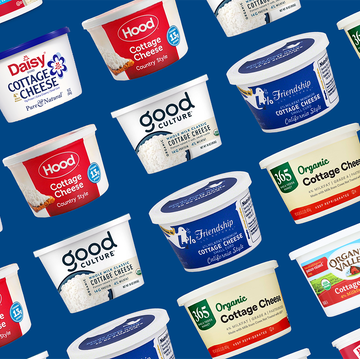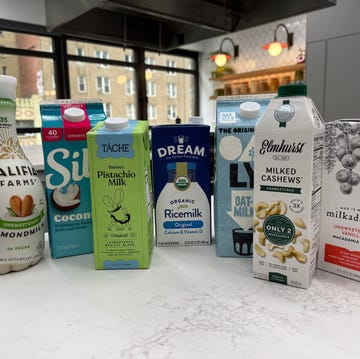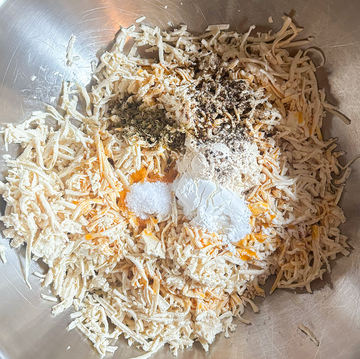Anybody who's ever had any ailment — head pain, swollen gums, naggy mom — has been told to drink more water, because that's supposedly the answer to any health woe.
While we can't confirm that drinking more water is an all-encompassing health solution, keeping our bodies optimally hydrated is extremely important. We need water to regulate our body temperature and get rid of excessive heat. Plus water is crucial in maintaining kidney function and clearing out toxins that naturally build up from our day-to-day lives, says Aaron Clark, DO, family medicine physician at Ohio State's Wexner Medical Center.
When you take a sip, your body's no dummy — it knows exactly where to send the H20.
"The body is amazingly smart and it will use water as needed," says Dr. Clark.
Assuming you're healthy, a glass might go toward adding fluid to your bloodstream or helping flush out toxins. And you don't have to chug tons: if you drink more than needed, you'll simply pee out the excess. (Meaning those popular one gallon H20 challenges a day are totally unnecessary.)
But when you don't get enough, your body — and brain — suffers. Here are five signs that you might need to up your water intake.
1. Foggy Headedness
Are you having trouble concentrating? In a 2012 review in the Journal of the American College of Nutrition, researchers found that being mildly dehydrated by only 2 percent hinders attention and memory. And that's just the tip of the iceberg. A few other smaller studies have linked dehydration with higher anxiety and fatigue among young men, grumpiness and trouble completing tasks among young women, and grogginess and confusion among young women.
Researchers say the brain drain may have evolved to alert humans before dehydration gets worse. But by that time it can already be dangerous. Another small 2015 study on 11 men in Physiology & Behavior suggested that the cognitive problems associated with dehydration can increase driver errors, making your risk on the road similar to a drunk (or sleep deprived) driver.
2. Constipation
While many of the signs on this list are symptoms of mild dehydration (which are easily corrected by having a drink), constipation can be a sign of more chronic dehydration, says Clark. Your bowels need H20 to keep things moving. When your colon absorbs too much water, it makes stools hard, lumpy, and difficult to pass. In a large 2013 study in the American Journal of Gastroenterology, inadequate fluid intake made women 30 percent more likely to suffer from constipation. Drinking up, the study authors wrote, is a good way to treat the problem.
3. Poor Exercise Performance
Taking your run outdoors when it's hot is a recipe for getting super sweaty. But if you sweat too much and don't replace it with fluids, you're at risk for heat cramps, and worse, heat exhaustion. It'll not only tank your ability to perform, but you'll experience physical symptoms like cool skin, weakness, and dizziness. To prevent heat emergencies, pre-hydrate 20 to 30 minutes prior to exercise with 15 to 20 oz of water. And when it's hot, sip every 20 minutes during exercise, says Clark.
4. Peeing Problems
When there's not enough water running through your body, your kidneys won't produce much urine, says Clark. Because it's more concentrated, you'll probably notice a stronger odor to it along with a darker color. The highly concentrated stuff can also make peeing "a tiny bit uncomfortable and irritating," he says.
5. Headaches
Even mild dehydration can bring on persistent head pain.
"We don't know exactly why, but it may have something to do with the fact that dehydration decreases the fluid levels around your spinal cord and brain, which may affect the pressure in your brain," Clark says.
For migraine and tension headache sufferers, dehydration is a trigger, according to a 2010 review in the Handbook of Clinical Neurology. The authors cite past research that showed drinking 2 cups of water brought relief to most people.
How to Drink Smart
"There's not a lot of evidence to support the idea of drinking eight glasses a day," Clark says. One possible perk of using those guidelines is that it's a reminder for most people that they're probably not drinking enough.
The Institute of Medicine (IOM) recommends that adult women get 91 ounces of total fluids per day — which includes tea, coffee, and juice. You're probably eating your water, too. The IOM notes that 20 percent of our water comes from juicy foods like fruits, veggies, and soups.
Gauging if you're drinking enough water can be as simple as checking how you feel. If you're not feeling tired, headachy, or seeing dark urine, then you're probably properly hydrated, says Clark.
If you're extra curious on the effects water has on your body, see for yourself in Ted-Ed's video below. You'll probably want a glass by the end.
[youtube ]https://www.youtube.com/watch?v=9iMGFqMmUFs&nohtml5=False[/youtube]
Follow Delish on Instagram.













